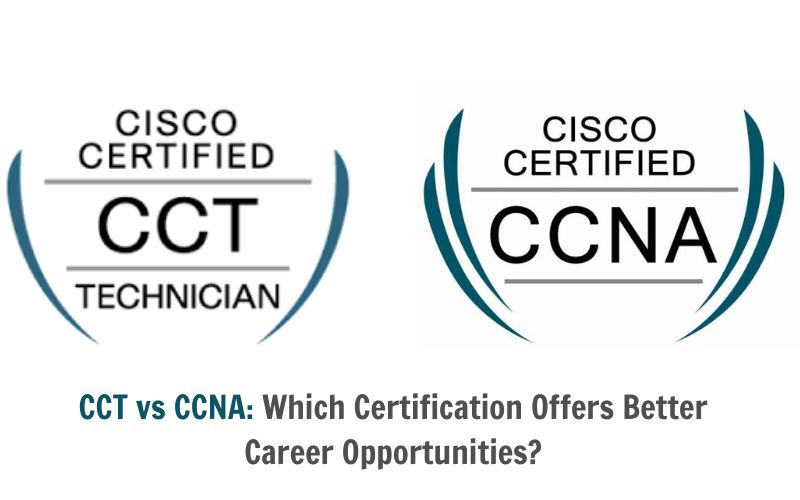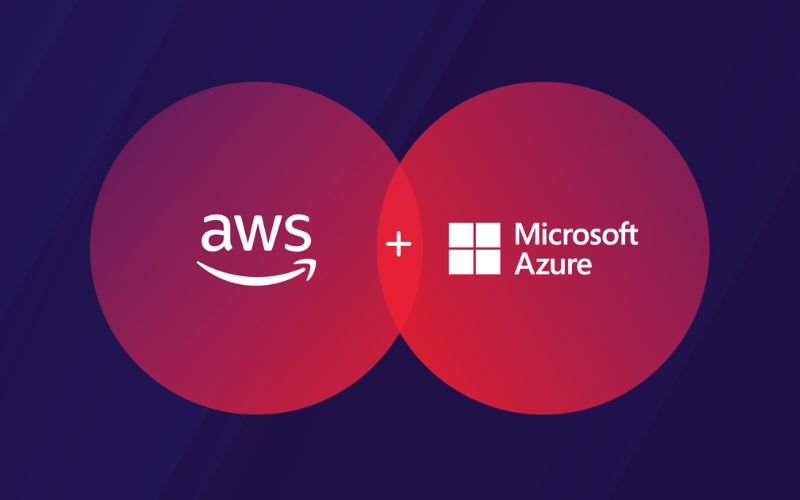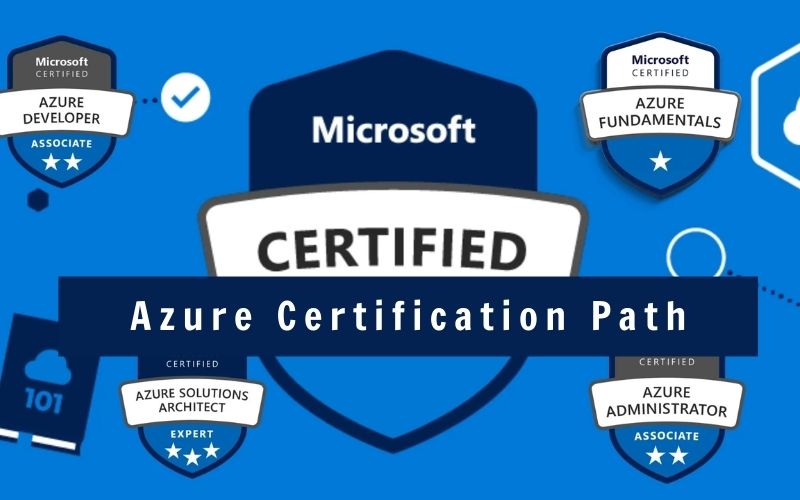Looking to break into the tech industry but don’t have a degree? In this guide, IT Exams will show you how to get into it without a degree, including tips on building your skills, creating a strong resume, and finding the right job opportunities.
What Are Some Myths And Facts About Getting Into IT?

It’s much easier than you think to get into IT without a degree.
If information technology is on your radar but you’re not sure where to begin, you’ll be relieved to discover that you may not need another degree – or even a college degree at all! First, let’s dispel some myths and truths regarding entering the IT field.
Myths
- To work in IT, you must have a four-year degree in computer science.
- To secure an entry-level tech support position, you must have a technical degree.
- The skills required to flourish in a technological career are only taught in college.
- Your educational qualifications are more important to IT hiring managers than anything else.
Facts
Searching for job ads in IT fields such as web development, cybersecurity, software development, mobile app development, and help desk support on popular job posting sites such as Indeed and Monster may reveal a trend in the qualification sections:
“A high school diploma or the equivalent is required.”
Numerous IT occupations do not require a four-year degree or even a two-year degree, as seen by numerous IT job ads. If a lack of a degree has kept you from pursuing a career in technology, you should know that most IT jobs merely demand proof that you can do the job, such as certificates and past experience. Hiring managers do not exclude potential job prospects because they do not have a bachelor’s degree.
10 IT Jobs You Can Get Without A Degree

Many IT workers begin as self-taught students and subsequently continue their studies. They often pursue this degree when they are ready for a promotion or an alternative professional path that may be a better fit for their talents and personal interests. They continue to study through certificate programs, regular degrees, or attending classes in areas where they want to get more information.
1. Computer support specialist
The national average annual pay is $36,192.
Primary responsibilities: Computer support personnel assist with computer problems and network monitoring. A remote professional conducts a series of questions to get an understanding of a client’s problem before walking them through the solution. They also collaborate directly with customers to install and use new gear and software. Computer repairs may also be performed by an expert. This role necessitates prior knowledge addressing typical computer difficulties. Knowledge of programming languages and operating systems is advantageous.
2. Junior data analyst
The national average annual wage is $45,094.
Primary responsibilities: As a junior data analyst, your major role will be to help upper-level analysts with data retrieval, cleaning, and organization. Junior analysts often help with data input in databases and data processing for consumers. Without a degree, you will need to pursue self-education to begin working as a data analyst. Data scientists, for example, should comprehend at least one programming language, be able to understand how data differs in each business and be prepared to attend data science classes. So, while a college degree is not required, you must be knowledgeable in the subject.
3. Help desk analyst
Average annual wage in the United States: $46,059
Primary responsibilities: A help desk analyst provides technical support to end users over the phone or via email. They keep track of typical problems and create instructions to assist consumers fix them promptly. They also work with senior personnel and IT support on installations and technical solutions. The help desk role may be found in nearly every industry, from software to home security troubleshooting.
4. Computer Programmer
The national average annual wage is $49,525
Primary responsibilities: Computer programmers are in charge of writing, updating, and troubleshooting existing programs utilizing various computer languages. Debugging code, establishing computer infrastructure, and managing operating systems are among the other responsibilities. Programmers can have a long and prosperous career if they are eager to study and expand their skill set.
5. Web developer
The national average annual wage is $72,220.
Primary responsibilities: Web developers are classified into three types: frontend, backend, and full-stack. A front-end developer creates the user interface for a website. They collaborate with a graphic designer, use a template, or create the design themselves, and then code everything to make it usable. A backend designer ensures that all components of the site’s infrastructure function properly. This covers application function and integration, database maintenance, and troubleshooting of areas of the website that visitors do not see.
Both of them are done by a full-stack developer. Although many web developers have college degrees, many also take online courses, practice self-study, and are largely self-taught. As a developer, the more talents you have, the more services you may provide to consumers.
6. IT manager
The annual salary in the United States is $88,959.
Primary responsibilities: IT managers supervise the operations of IT workers as well as the technology of a company as a whole. They look after an organization’s software and hardware and assess its requirement for electronic infrastructure. IT administrators can examine and install computer networks. To become an IT manager, you must have at least 5 years of experience in the sector and show expertise in your skill set. While an associate’s or bachelor’s degree will increase your chances, you may still have a successful career without one.
7. Computer software engineer
The national average annual pay is $106,435
A software engineer’s primary responsibilities include developing software solutions for organizational functionality in finance, marketing, customer relationship management, and other areas.
They also create software solutions for a variety of sectors. Flowcharts, layouts, instructions, and coding are all used by software developers to record their work. Learn computer software engineering by putting in the time, taking local and online classes, and searching for a mentor.
8. Cybersecurity specialist
The national average annual pay is $106,435
A software engineer’s primary responsibilities include developing software solutions for organizational functionality in finance, marketing, customer relationship management, and other areas. They also create software solutions for a variety of sectors. Flowcharts, layouts, instructions, and coding are all used by software developers to record their work. Learn computer software engineering by putting in the time, taking local and online classes, and searching for a mentor.
9. DevOps engineer
The national average annual wage is $125,214.
Primary responsibilities: DevOps engineers are in charge of creating, updating, and deploying software solutions for internal systems. They monitor server health and collaborate with software developers, IT experts, and system operators to install new code and find areas for improvement. DevOps engineers must have five or more years of hands-on experience building software and controlling business infrastructure operations.
10. Software Architect
The national average annual wage is $138,943.
Primary responsibilities: Software architects utilize their technical and analytical abilities to create whole systems based on customer specifications. People in this role frequently work with business executives, engineers, and other developers to ensure that customized software is clear and accessible to non-tech users. Among other things, they supervise the code, define development standards, and keep the project on track. Software architects are well knowledgeable about programming languages and operating systems. Taking classes and seeking a mentor are excellent ways to move in the right direction toward becoming a software architect.
Transferable Skills Needed For Your IT Job Without A Degree

IT occupations aren’t only for math whizzes who like to work alone in dark rooms. In most situations, the idea you may have in your brain about who is well-suited for a technology career is completely false. Your existing abilities might assist you to go into IT.
You’re not a math whiz? The vast majority of IT professions do not require significant math skills. To help yourself and others better harness the power of technology, all you need is a growth mindset and the willingness to learn new things.
And if you enjoy interacting with others, you’re in luck. A large part of tech professions demands you to work in groups or assist colleagues in solving technical challenges. If you are not a people person, you may suffer in IT.
Communication, creativity, problem-solving, and attention to detail are all valuable abilities to have if you’re changing jobs into IT. As previously said, most occupations in information technology demand you to work on a team or with colleagues to solve technological problems. This is when your adaptable communication skills will shine.
Creativity is required in software and web development positions, where you will be asked to come up with innovative ideas to create and improve new products. In other jobs, your imagination will come in helpful as you devise novel solutions to technological problems.
The most crucial talent to have in technology is problem-solving. You’ll flourish in the field if you know you’re tenacious about working out answers.
If you’re attempting to fix a line of code or spot a cybersecurity danger, you’ll need to pay attention to detail, and this talent will take you far in IT.
These are just a few of the transferable talents that might help you stand out as a candidate for an IT career.
What You Need To Qualify For Jobs Without A Degree

This is dependent on the sector of information technology you believe is optimal for your career transition. Here are a handful of the many popular IT occupations that don’t require a degree, as well as typical requirements to qualify for them:
Web/App Developer
Demonstrate your command of HTML, Python, Ruby, CSS, and JavaScript, as well as your ability to use these languages to develop appealing and functioning web products. On edX, you can begin learning to code for web and mobile applications for free right now. edX also provides certificate programs for a little charge to demonstrate that you’ve finished crucial coding courses. You may also consider attending an intense coding boot camp, which will teach you the ins and outs of becoming a web developer over the course of a month or two. (depending on the structure of the boot camp). Codeacademy, MIT OpenCourseware, and Khan Academy are excellent resources for learning the skills required to become a web developer.
Help Desk Technician
Ensure that you have the knowledge and abilities to assist individuals in solving complicated technological challenges in a business setting. Help desk professionals must be competent to diagnose and handle hardware, software, and network problems. Most entry-level help desk jobs require the CompTIA A+ IT certification. There are a variety of online and in-person seminars and training programs available to assist you to prepare for the CompTIA A+ certification test. Find out more about becoming CompTIA A+ certified.
Cybersecurity Specialist
To get one of the top IT jobs today, demonstrate expertise in a help desk, technical support, or networking function and complete cybersecurity training. Employers frequently favor people who have cybersecurity credentials such as the CompTIA Cybersecurity Analyst (CySA+). If you’re new to IT but know you want to work in cybersecurity, start with CompTIA A+, CompTIA Network+, and CompTIA Security+. After a few years of hands-on cybersecurity experience, you may achieve the CySA+ certification to certify your expertise.
Systems Administrator
Be able to provide solutions and assistance for software, hardware, operating systems, apps, and corporate data, as well as knowledge of virus and malware protection. Most systems administrator roles require CompTIA A+ and CompTIA Network+ certifications, as well as experience in an entry-level help desk function.
Remember that many hiring managers will be looking at your transferrable and professional talents as well. Even if you’re switching jobs from a completely other industry, your past work experience and accomplishments are important. Make sure to emphasize relevant skills and accomplishments in your CV and applications.
How To Get Into IT Without A Degree

Make use of applied learning
With Simplilearn’s material, a training program based on an applied learning technique supplements live, instructor-led classroom instruction. Simplilearn’s online courses combine the flexibility of self-paced online training with the personalized attention of instructor-led live virtual classroom education, as well as the practical experience of hands-on projects and laboratories.
- Courses offered by Simplilearn include:
- Courses in Business and Leadership Certification
- Programs for Project Management
- Courses in Data Science and Business Analytics
- Learn about Cloud Computing Training.
- Courses in Digital Marketing Certification
Obtain certification
Whether you have a degree, a certification from an industry authority organization, or a software supplier may assist begin your tech career by giving independent verification that you have completed the necessary training.
Create projects
Hands-on practice is not only an excellent approach to reinforce learning; it also gives you assignments, use cases, and applications that employers may utilize to demonstrate your development abilities. Onalytica ranks Mike Tamir, Ph.D., as the number one global influencer for Machine Learning and Artificial Intelligence.”Then it’s just a matter of building something,” he continues, “and then putting it up on GitHub for the rest of the world and employers to see.” Regardless of whether you have a degree, a certification from an industry authority group or a software supplier can help you start your IT career by providing independent evidence that you have completed the required training.
Make projects
Hands-on practice is not only a great way to reinforce learning; it also provides you with tasks, use cases, and applications that companies may use to assess your development skills. According to Onalytica, Mike Tamir, Ph.D., is the top worldwide influencer in Machine Learning and Artificial Intelligence.
“Working on a lot of projects can help a lot with preparation.”
FAQs

Is IT possible to get an IT job without a degree?
Some of these positions are in great demand and provide online training, such as network engineer, cybersecurity analyst, and web developer. Without a college degree, there are several professional prospects in the technology field.
Can you make 100k in IT with no degree?
Without a degree, it is feasible to have a job that earns $100,000 per year. Some businesses value skills and experience more than others, and many organizations provide on-the-job training. To earn a job paying six figures without a degree, you must have a career goal and a set of professional abilities.
Almost nine out of ten billionaires are college graduates, nearly one out of every two millionaires has a doctorate-level degree, and social media influencers who declare your degree is worthless are factually inaccurate and statistically lying to you.
How do I start a career in IT?
- Examine and Apply Your Previous Experience in the IT Industry.
- Achieve Industry Certifications.
- Your degree in another field might be very useful.
- Be willing to begin at the bottom.
- Don’t Underestimate the Power of Networking.
- Learn and Practice Relevant Tech Skills.
Can I get a job at Google without a degree?
No, a CS degree is not necessary for the majority of our software engineering or product management positions.
How many millionaires are without a degree?
84% of the world’s top 400 wealthiest people hold a bachelor’s degree or above. Indeed, 24%, or almost one-fourth of this group, have a bachelor’s degree from an Ivy League institution like Harvard or Yale. Furthermore, according to Ramsey Solutions’ National Study of Millionaires, 88% of millionaires have at least a bachelor’s degree and 52% have a Ph.D. or doctorate degree.
Final Words
In conclusion, getting into the tech industry without a degree is definitely possible, but it requires a combination of hard work, dedication, and strategic planning. By following the tips outlined in this guide, such as building your skills through online courses, creating a strong resume, and networking with industry professionals, you can increase your chances of landing a rewarding career in tech. IT Exams hope this comprehensive guide on How To Get Into It Without A Degree? is helpful for you! Remember, the key is to stay motivated, keep learning, and never give up on your goals. Good luck!
[Sassy_Social_Share]


